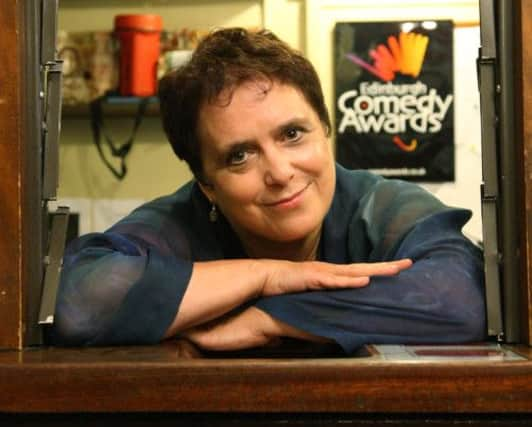Nica Burns says comedy still strong at Fringe


Nica Burns, director of the Edinburgh Comedy Awards, insisted the comedy offering at the Festival was stronger than before, partly as a result of the number of big-name acts returning to play in intimate venues this year.
However, she said audiences were being left disappointed by many free shows because comics who only had up to 20 minutes’ worth of material were having to stretch out shows to an hour.
Advertisement
Hide AdMs Burns also said the advent of comedy shows on television and the arena tours being staged by big-name comedians had left acts at the “bottom end” of the scale struggling.
She launched a spirited defence of the Fringe’s experienced comedy critics, claiming it was more important than ever before that audiences knew who to turn to for an expert view amid a growing number of bloggers and online review sites.
This is the 33rd year of the awards, which helped launch the careers of the likes of Steve Coogan, Sean Hughes, Emma Thompson, Stephen Fry and Lee Evans. The main comedy show winner last year was Doctor Brown.
Ms Burns, speaking at the launch of this year’s contest, said more shows than ever before – almost 600 – would be eligible for the Edinburgh Comedy Awards, despite the proportion of comedy in the Fringe programme dropping.
Former award winner Jenny Eclair is among the big names making a return to intimate venues at the event in 2013, along with David Baddiel, Alexei Sayle, Sarah Millican, Omid Djalili and Alan Davies.
Exactly a third of shows at this year’s Fringe are in the comedy category – compared to 22 per cent in 2005 – while theatre was the next biggest section in the 2013 programme, at 29 per cent.
Advertisement
Hide Ad“We’ve got another bumper year on the surface of it. It’s the biggest ever Fringe once again; comedy is still the biggest sector and we have more eligible shows than ever before, there are almost 600 now.
“Seven or eight years ago there was a massive jump in the number of comedy shows. There were always more theatre shows at the Fringe up until then, but that’s when it changed and comedy has been the biggest category since then.
Advertisement
Hide Ad“Although it looks as if there are fewer comedy shows this year, around half of the shows in the cabaret section are eligible for our awards, while the Free Fringe also accepts show until the last minute.”
There has been a huge boom in the number of free shows at the Fringe over the last few years, with just 177 registered in 2006 compared to 713 this year. Most are comedy shows.
Ms Burns, who has been the helm of the awards, formerly sponsored by Perrier and now backed by Foster’s, for three decades, said although the Free Fringe had made the event more affordable for many, a lot of acts were simply not ready.
She told The Scotsman: “The Free Fringe was a great idea.
“Edinburgh was getting very expensive and it was meaning a lot of people couldn’t afford to come. It was getting too expensive for performers to come here and ticket prices had gone up too much. It has taken the Fringe back to the early days.
“But I do think that, on the downside, a lot of performers come to the Fringe when they are simply not ready. They’ve not done the work, they’re not good enough and the public go along and have an absolutely terrible experience.
“Where comedians have only really got 20 minutes of material they are pushing into a 50-minute or hour-long show. It’s a huge leap between the two.
Advertisement
Hide Ad“The Free Fringe performers maybe don’t have as much financially at stake and think they’ll go along and give it a go, which in a sense is what the Fringe is all about, but if you are serious and want to be a professional you’ve got to really work at it and pace yourself, and not do it too quickly.”
Ms Burns said television shows like Michael McIntyre’s Comedy Roadshow and Live at the Apollo had led to huge opportunities for comedians. She added: “The balance has shifted over the last decade. There are more comedians who can sell out arenas. They are doing it very quickly, in a matter of just a few years after hitting the headlines, including people like Russell Howard, Sarah Millican and Mickey Flanagan.
Advertisement
Hide Ad“Comedy has been the single largest growth area in entertainment in the UK over the last ten years. There are more people than there have ever before at the top end, but it is having an effect on the comedy clubs, at the bottom end. There are a lot of opportunities now for people to try to be comedians, and they’re not all brilliant. Let’s be honest about it.
“The difference between the working comic at the top end of the industry and someone who can’t do 20 minutes in a club is large. There are too many people giving it a go at the bottom end.
“What’s great about the Fringe is the number of big names coming back to play a whole run of shows in smaller venues. Fewer people are coming back just to try to make money.
“It’s a great opportunity to come back and try out new work; there’s nowhere like the Fringe to do that. There is also a tremendous loyalty there towards certain venues where people started, like the Gilded Balloon and The Stand.”
Nominations for this year’s awards will be announced on 21 August. The three category winners will be unveiled on 24 August.